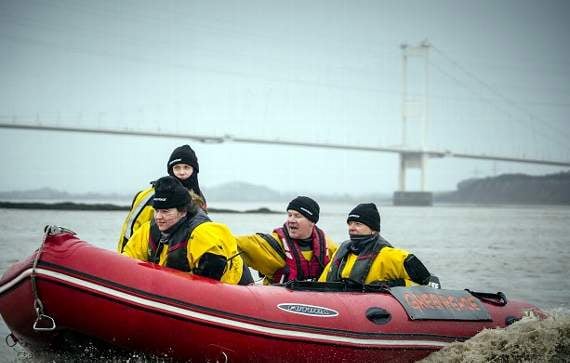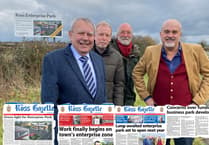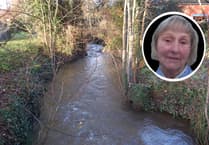HOLLYWOOD actress and director Bonnie Wright jetted in from her California beachside home to help Greenpeace UK launch a national survey of the level of micro-plastics in our rivers last week.
And the Harry Potter star, who owns her own production company Bon Bon Lumiere, measured the scale of the problem from the old railway bridge at Redbrook beside the Boat pub, next to Tintern Abbey and at Chepstow, where she passed the castle and cruised under the old Wye bridge out into the Severn estuary in a Greenpeace UK launch.
She warned: “I think it is incredibly worrying. Every time I have trawled for plastics, like we have done today, there’s not been a time the net hasn’t come up with some type of micro-plastics. It just shows that in this tiny section of a river, there is plastic.”
Keen surfer Bonnie helped take water samples using a filtering device called a manta net when she visited the Wye Valley last week (Tuesday, March 5). They will be sent to the University of Exeter for further analysis and compared with samples from other rivers across the UK.
“I was shocked to learn that most of the plastic I’ve used is still somewhere on Earth,” said Bonnie, who also starred in A Christmas Carol and The Sea.
“Yet every year we just keep producing more and more, at a rate that isn’t sustainable, and there’s nowhere for it all to go.
“It’s killing wildlife and there are growing concerns that it may be affecting our health, so we’re here today to urge the UK Government to take action: to set targets to phase out single-use plastics,” added Bonnie, who has a lifelong love of the sea after spending much of her childhood beside it.
Exeter University ecology lecturer, Kirsten Thompson, who is overseeing the sampling, said: “A lot of studies show how much plastic is in our seas and oceans, but very few so far investigate the amounts and types of plastics, especially micro-plastics, carried along by our rivers.
“This is the first nationwide investigation into micro-plastic pollution in Britain’s major rivers.
“Documentaries like Blue Planet show just how detrimental plastic pollution is to marine wildlife, but we hope that our research on rivers in England, Scotland, Wales and Northern Ireland will help uncover exactly where this plastic is coming from and what impact plastic pollution may be having closer to home on creatures like otters, kingfishers and water voles.”
Fiona Nicholls, Greenpeace UK plastics campaigner, added: “More frightening facts seem to emerge about plastic pollution every month.
“It’s in our water, our food, the air; it’s polluting the most remote parts of our planet. But the scariest fact is that if we carry on with business as usual, plastic production is set to quadruple by 2050.
“It’s clear our rivers and oceans simply can’t stomach this. That’s why Greenpeace is urging the government to ensure that their new Environment Bill sets specific targets for reducing the amount of throwaway plastic being made.”




Comments
This article has no comments yet. Be the first to leave a comment.